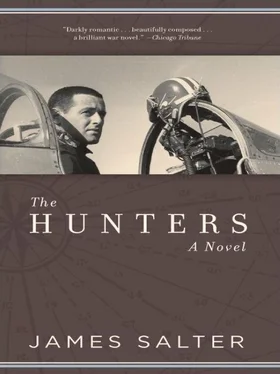In the loose, laundered folds of the kimono, Cleve felt completely at peace. Even the vestments of the war were gone. He nibbled at what must have been fish pretzels on a tray. Soon the door slid open again, and two elaborately costumed, scrubbed girls entered, bowing politely, and sat down between them. They seemed as demure as schoolgirls. They talked shyly in broken English, giving their names. After a while, one went for a samisen. They reclined and listened to her play and sing in a distorted, high, haunting voice. The girls sat respectfully upright. One of the songs was “China Night.” It was DeLeo’s favorite. Shina no yoru. They played it again and again for him, one singing and the other humming. A serving girl brought warm vials of wine on a tray.
Later, they went to the baths. They sang while the girls washed and rinsed them, and then climbed down together, all of them, into the smooth sand-colored tile pool. The water was clear and scalding. Everything was washed away. He floated in a dream of disconnected languor. The girl was in it, too, with her flawless skin and sturdy body sensuously distorted beneath the surface. Her hair was done up carefully, piled on her head, protected by a towering towel. She had abandoned the virtuous reserve of upstairs. She caressed him beneath the water. She presented herself to him deliberately. They laughed at nothing. They played like children in the steamy room.
In the thick bedroll on the tatami floor, she was as obliging as a new wife. He woke up twice during the night. She was instantly awake and seemingly pleased both times.
The next morning they were in the baths again at seven o’clock, sitting naked on the wooden stools or in the hot water, shaving. The soaking was like being born again. Outside, through the windows, the morning looked gray, and Cleve noticed a light scum on the surface of the fish ponds, but the spell was not gone. He was still king. He and DeLeo were brothers, sharing the riches of empire together. Beyond the roofs, he could see the tips of distant smokestacks with their blackened mouths beginning to issue smoke as the working day started for lesser men.
“We should never come back here, Bert,” he said. They were on a plateau of existence somehow, between safety and doom.
“Why not?”
“This is the greatest life in the world.”
“Certain parts.”
“All of it. It’s the way to die, too.”
“I keep thinking there must be a better way,” DeLeo said.
“No. The way to go is in an instant, reaching for that highest one of the stars and then falling away, disappearing, against the earth. I wouldn’t mind that, would you?”
“Some of your ideas, Cleve…”
“Ridiculous, eh? I’ve carried them around for years; and now, at the time they ought to be the truest, so few of them are worth a damn.
“Odd. Everything about this ought to be perfect for you and me. Here we are, by sheer accident, in the most natural of worlds, and of course that means the most artificial, because we’re very civilized. We’re in a child’s dream and a man’s heaven, living a medieval life under sanitary conditions, flying the last shreds of something irreplaceable, I don’t know what, in a sport too kingly even for kings. Nothing is missing, and yet it’s the men who don’t understand it at all that become its heroes.”
DeLeo listened quietly.
“Or maybe they do understand,” Cleve said, “and I don’t. Tell me, Bert, what do you think is important here?”
“It’s a war,” DeLeo said. “MIGs.”
“Nothing else?”
“Staying alive.”
“That’s not very much.”
“Without the MIGs, the rest doesn’t matter.”
“You may be right.”
“Believe me.”
“My God, though, if someone tries…”
“It’s not enough. In this greatest life of yours, you have to win.”
Cleve was silent for a while. He lathered his face and began to shave.
“If it’s not enough,” he repeated, “this isn’t anything to be proud of.”
“Maybe it’s enough for me. Not for you, though.”
“We’re the same.”
“Not really,” DeLeo said.
Cleve glanced briefly at him lolling in the bath, the water up to his neck and his eyes closed. When he looked back in the mirror, everything had changed somehow. The passionate moments had passed. It was as if the harsh light of day had suddenly fallen full on them.
The girls attended them until they were dressed and ready to leave. They seemed to share a regret that it was over with.
“You rear gentreman,” Cleve’s said to him hesitantly.
“We’re no gentlemen.”
“Yes, yes, you are.”
“No.”
She smiled. She seemed very small now and young.
“You good captain,” she insisted.
“No.”
“No good captain?”
DeLeo laughed.
“She knows you, all right,” he said. “No-good captain.”
She was such a child. Cleve felt like a fool standing there. “Goodbye,” he said.
“Yes. Guddo-bai.” Then quietly, “Guddo-bai.”
They did not stay long at the Astor. That morning, DeLeo began packing. He had made some telephone calls and arranged for them to move to the Hosokawa. Cleve was not enthusiastic.
“Why?” he asked. “This place seems fine to me.”
“You’ll like it better there. I guarantee it.”
“I don’t like moving. Does it have a bar?”
“Of course.”
“A barber shop?”
“No barber shop.”
“I knew it,” Cleve said. “We’ll have to shave ourselves there.”
“What an inconvenience. Why don’t you get started packing?”
“It’s just that I’m accustomed to service. And this fellow here is a terrific barber.”
“How do you know? You shaved yourself this morning.”
“I like the way he limps.”
“I haven’t noticed him doing any limping.”
“He has a bad leg. I think he was wounded in the war. I’ve been looking forward to hearing about it tomorrow morning with a nice hot towel on my face.”
“Come on. Maybe we can come back some time for a haircut.”
It was not a long trip. The Hosokawa was less than half a mile away. Despite himself, Cleve liked it the moment he entered. It had once been the residence of a prince, and beautifully maintained grounds encircled it. Also, it was distinctly more Oriental. They had to remove their shoes at the entrance and put on the hotel’s slippers.
They stopped at the bar for a drink and read through the newspapers. There was not much in them about the war. The front was quiet, and there had been no air action at all. They went in to lunch. The dining room opened onto the gardens. It was a rare afternoon. Sunshine made the evergreens glisten, and a stream as clear as ice passed soundlessly among carefully set rocks streaked with pale moss. They were the only ones eating. There was, overall, the dignity of a great estate. The food was excellent. They had not had breakfast and were hungry.
That night they started at the Mimatsu, which DeLeo called a place of great historical interest. For reasons of his own, he said. It was a night club the size of an auditorium. Hostesses in evening gowns came to sit with them.
“Fighter pirot, no?” one said, smiling.
“How can you tell?”
“Aw same fighter pirot, big here,” she pointed to her wrist where a watch might be, then to her lap, “sma’ here.”
To applaud the floor show they were given a kind of fireworks that exploded into confetti. Each act was followed by a barrage of sharp explosions and blizzards of colored paper drifting through the spotlight beams. DeLeo’s girl wore a dress of tight, violet satin. She said that her name was Sunday. She looked more Indonesian than Japanese and had dazzling, even teeth.
Читать дальше












